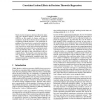Free Online Productivity Tools
i2Speak
i2Symbol
i2OCR
iTex2Img
iWeb2Print
iWeb2Shot
i2Type
iPdf2Split
iPdf2Merge
i2Bopomofo
i2Arabic
i2Style
i2Image
i2PDF
iLatex2Rtf
Sci2ools
UAI
1997
1997
Correlated Action Effects in Decision Theoretic Regression
Much recent research in decision theoretic planning has adopted Markov decision processes (MDPs) as the model of choice, and has attempted to make their solution more tractable by exploiting problem structure. One particular algorithm, structured policy construction achieves this by means of a decision theoretic analog of goal regression, using action descriptions based on Bayesian networks with tree-structured conditional probability tables. The algorithm as presented is not able to deal with actions with correlated effects. We describe a new decision theoretic regression operator that corrects this weakness. While conceptually straightforward, this extension requires a somewhat more complicated technical approach.
| Added | 01 Nov 2010 |
| Updated | 01 Nov 2010 |
| Type | Conference |
| Year | 1997 |
| Where | UAI |
| Authors | Craig Boutilier |
Comments (0)

